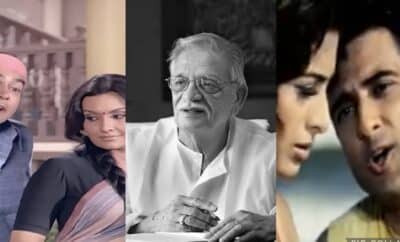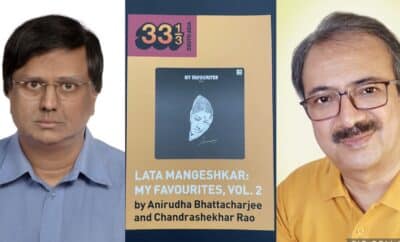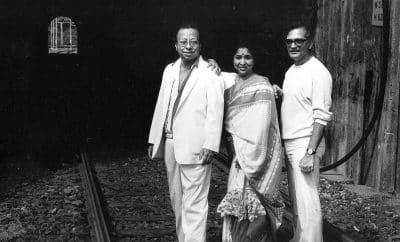Song Sketch
Tear Messenger – Paani Paani Re – Maachis
Meghadoota by Kalidas is a lyrical poem of about some more than 100 stanzas. It is one of his most famous works. Meghadoota literally means A Cloud Messenger. It is the narration of a Yaksha from King Kubera’s court, who has been exiled for his misdoings. In this narration the Yaksha persuades a passing cloud to take a message to his wife who resides in the Himalayas. While his wife is awaiting his return, the Yaksha, describes all the beautiful sights the clouds might see on its way.
While Kalidas has made cloud a messenger, Gulzar made water/tears his messenger. Observe when he says –
Paani paani inn pahadon ki dhalaanon se
Utar jaana
Dhuan dhuan bhi kuch waadiyan aayengi
Guzar jaana
Ik gaon aayega, mera ghar aayega
Jaa mere ghar jaa
Neendein khaali kar jaa
Paani paani re khaare paani re
Nainon mein bhar jaa
Neendein khaali kar jaa
Khaare paani are the tears. Gulzar asks to let the tears roll down for they carry the message. When the heart is full of reminiscence and nostalgia, tears are bound to flow. He asks these tears to flow through the mountains and valleys, the slopes and the descends. For when they will descend they come across a village, his village. In this case, Tabu’s village. On the way, there might be obstacles or someone might try to hinder its way. But Gulzar asks the tears to just make way through them and continue with the journey towards the village – Dhuan dhuan bhi kuch waadiyan aayengi,Guzar jaana. Just visit my home, let my people there know how empty, worthless and abandoned I feel without them.
Maachis (1996) a cinematic gem by Gulzar. Based on the backdrop of the assassination of the then Prime Minister Indira Gandhi. It depicts the true situation of the Punjab and an aftermath of Operation Blue Star. Maachis symbolises the youth as the matchstick . If misguided they will destroy everything around them like jungle fire but if handled ably they will light up your lives. A spine chilling drama with a tender love story, where Tabu shines in the pivotal role. She bagged a National award and the movie was appreciated by the critics as well as the masses. Watching Tabu onscreen and hearing Lata Mangeshkar off screen simultaneously is indeed a treat. The emptiness, the hollowness in her heart and eyes, stir the feelings within you. Her stoic face tells the story of the dreaded episodes in her life.
At the beginning of the song, one hears the flowing water. Followed by an ultra fine jal tarang and then the rhythm of the matka prepares us for the nightingale’s voice. How appropriately has music director Vishal Bhardwaj used these instruments in connection with water. While Lata starts humming, you know its going to be a delight hearing it again and again. Hear her say In pahadon ki dhalaanon se, you get the actual feel of sliding down. Vishal Bhardwaj has given delicate treatment to Gulzar’s words. Sometimes he uses an abrupt stop to the word jaa while at times he drags it languorously jaaaaaaa. It kind of decorates the song.
Ye rudaali jaisi raatein, jagraaton mein
Bita dena
Meri aankhon mein jo bolni ke paakhi ko
Udaa dena
Barfon mein lage mausam pighle
Mausam hare kar jaa
Neendein khaali kar jaa
Paani paani re khaare paani re
Nainon mein bhar jaa
Neendein khaali kar jaa
Rudaali is the weeping woman or the woman hired to cry over a dead body (A Rajasthani word). The Rudaalis cry themselves hoarse making the atmosphere gloomy, mournful and depressing. Gulzar compares the lonely, empty nights to a Rudaali. It keeps him awake and morose. Yet he’s hopeful that the winged creatures in his eyes, the words would fly out to the loved ones. Spreading the warmth around which might melt the snow, the stiffness in his life. Mausam hare kar jaa – let there be greenery, the warmth of the sun. Let those gone days be back.
The song makes you realise of your loved ones. Of the saline waters and empty dreams!!!
https://www.youtube.com/watch?v=io8k1atUqRI




Manisha
April 28, 2022 at 9:52 pm
Excellent!! Thank you so much!!